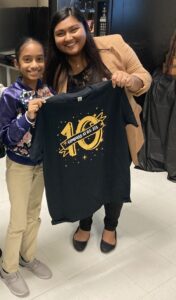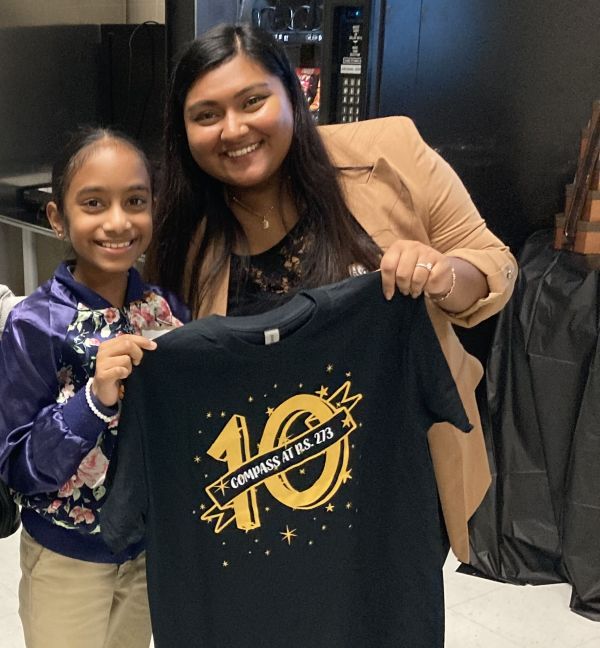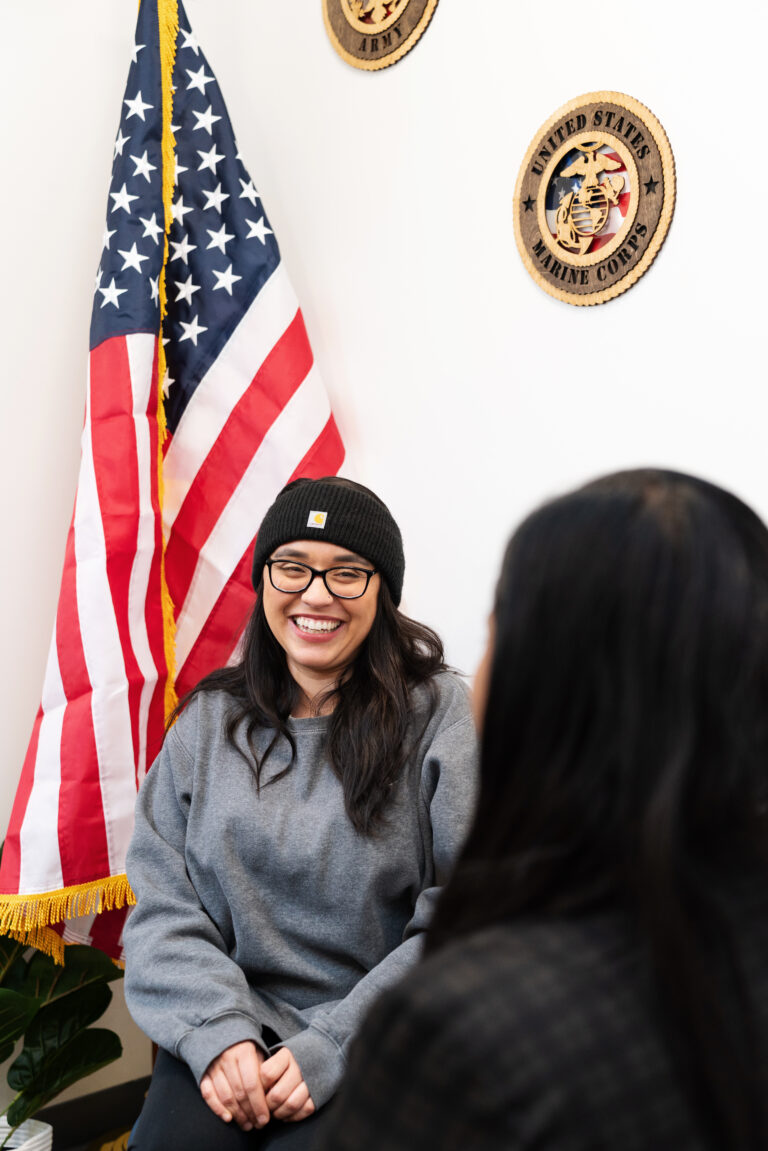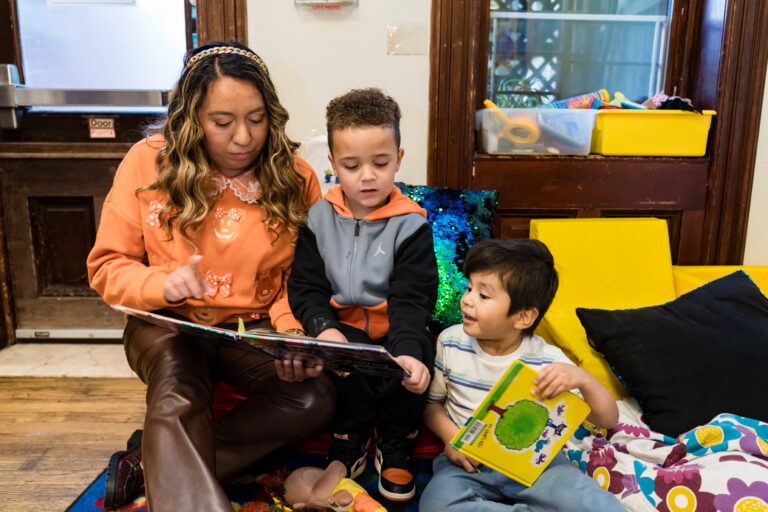Meet the program director of COMPASS at P.S. 273

Aliyah with 11-year-old Karisma, a former participant who stays in touch
As a child, Aliyah attended The Child Center’s COMPASS afterschool program at P.S. 56 in Richmond Hill, Queens. She now serves as program director at our COMPASS afterschool program at P.S. 273, also in Richmond Hill. Her shared experience with participants and their families helps her excel in her role.
“I remember the impact my group leaders had on me,” Aliyah said. “I was the quiet child. It was difficult for me to make friends. My group leaders made sure I felt included and got me involved in extracurricular activities—like fashion club—that I never would have done on my own, but which allowed me to connect with other students and be myself. I came to love afterschool because of how inviting it was. It became a comfortable place to be. If it weren’t for afterschool, I would’ve been home with my grandmother every day instead of coming out of my shell and socializing, and finding my strengths.”
Aliyah remembers the impact the Child Center team had on her brother and parents, too. “We adopted my brother from Guyana when he was 6,” Aliyah explains. “He didn’t know anything about school. It was difficult for him to adjust, and he would deflect by having difficult behaviors. My parents didn’t know what to do. But they trusted the Child Center team. My mom would confide in the group leaders, and the support they offered was a huge help to my parents. They were a sounding board for my mom. They heard my mother when she expressed anxiety about my brother’s ability to read. So they sat down with my brother with books and helped him with reading. They helped him adjust to school and life here with so much care and attention, and I’m sure that’s why he remembers them all these years later. He still lives in the neighborhood and sees his former group leaders out in the community. It’s a great feeling.”
Today, Aliyah strives to be that kind of support for the families enrolled in the program she oversees, and she supports the group leaders on her team to do the same.
During the COVID-19 pandemic, Aliyah realized how important the bonds of trust her team had built with families truly were. When school went remote, the team made phone calls to check on families. Many had lost jobs because they worked in the service industry or because they had to stay home with their children, who were too young to be left alone. Some were facing food insecurity. Others were concerned about their children’s behavior because the isolation had caused them to have no social life, act out, or be on a screen all day. Just as the afterschool team had been a sounding board for Aliyah’s parents, Aliyah and her team listened to families’ concerns, connected them with resources, and assured them the team was there for them. “Sometimes the relationships we have with these parents are based on them having someone they know that cares,” Aliyah explains. “They feel comfortable with us.”
Although there can be a lot of resistance to mental health services, for example, Aliyah and her team were credible messengers, and when they referred families to mental health services, “they were super thankful,” Aliyah says. “Sometimes the resources from a doctor didn’t work out because of the cost, and I was able to refer them to The Child Center’s family wellness centers. I could connect them with Benefits Access for assistance with food. It makes a huge difference.”
That’s why Aliyah says what she likes best about her job “is not just loving on the kids and having this great relationship with them; it’s the impact on the whole family. It’s nice to hear when a parent who wasn’t doing well four years ago is doing well now: They’re no longer living in a shelter and are living in a home, they have a job. … It’s like that with my own family, too. My parents were immigrants who struggled and saved their money, so I grew up with a sense of them working all the time. My dad just retired this year. He worked so hard for my siblings and me. Seeing him work for more than 30 years and now wake up when he wants and enjoy a slower and more enjoyable pace of life is really something.”
Another great part about her job is working with the very people who changed her life when she was a child. “Manisha [Singh, senior program director] was my group leader, and I was her student. Fast forward to 2019, and she was the one who interviewed me for the position of group leader. I said, ‘I don’t know if you remember me,’ and she was like, ‘Of course I remember you!’”
Things moved quickly from there. After brief stints as office manager and program coordinator, Aliyah assumed the position of program director in 2022.
“I remember every single one of my group leaders’ names—even my mom remembers!” Aliyah says. “Jennifer Alvarado, Nick [Ferreira, senior vice president of youth development], and Manisha were all staff when I was a student. It’s pretty neat that all these years later, they’re my colleagues. P.S. 273 is a 10-minute walk from my home. This is literally my community.”
Aliyah never forgets the impact her group leaders had on her, and it inspires how she interacts with children, families, and her team. “As someone who was in afterschool myself and now being a program director, I look back to what it was like being a child in afterschool. I want to ensure that the participants get from this program what I got out of it and more. I make sure my team knows our mission and goals as a program. They know they’re not here just to watch kids, but also to make sure they feel safe and heard and discover who they can really be. It’s an important job. I remember all my group leaders, and these kids will too. I take it very seriously. And I love it.”






